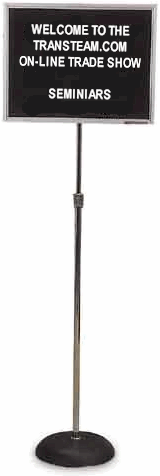On-line Trade Show - Seminars
Managers: the real deal
by Art Little
This article appeared in the March 2001 issue of Transmission Digest.
A good transmission shop manager is hard to find now days and even harder to recruit. Notice I did not say salesman. A salesman talks to the customers, gives the service recommendations, then sits back down and hopes everything else works out. Those guys in our industry do not qualify as shop managers. Sorry. A good transmission shop manager knows how to sell, manage production, and where to find the best deal on parts. Those are the big three. If he can do that, the technicians and customers love him and the shop makes money. It's not just a sales job any more.
The manager has to be a good salesman. Remember, nobody works until somebody sells something. If he can't sell, he can't be the manager. He gets fired pretty quick if he is lacking in sales ability or is afraid of the customer. He can know everything there is to know about production and parts and get fired the first day on the job if he can't sell. Sales is secondary to a good manager. It's automatic. It has to be because he spends most of his time managing production and ordering parts. So, when you are recruiting a manager, sales ability is the most important asset he has. But remember, it is only one of the big three packages a good manager brings to the table.
A good manager is organized and has a production board that everyone in the shop has been trained on. He sets the production schedule before he leaves work the night before and then has a production meeting before work begins the next day. When the meeting is over, everyone knows the exact order the manager wants the repairs for the day done in and they feel like part of his team when they leave and start to work. Goals are set at that meeting and the team works toward achieving those goals by the end of the day. He watches the repairs all day and if something happens to take him off his schedule, he immediately makes a change in the production schedule and puts it on the board. Otherwise, he leaves the employees alone to complete the work he has scheduled for them. This is good stuff now. Beats just having a salesman doesn't it?
Finding a manager that knows how and where to buy parts is like finding a needle in a haystack. The parts game is the most intricate game in our industry and it takes years to learn how to play the game and win. Saving a dollar is just like making a dollar and can make a big difference in your bottom line. A good manager will save you enough money to pay his salary. Hard to believe? Wait until you run into one of them.
Having covered the big three, a good manager also wears a lot of other hats. A good manager has to be a good psychiatrist. He handles everyone's problems. Owners, customers, and technicians all come to him with their problems. He is the pivot man of problems. He is a loan officer when a fellow worker is running short of lunch money. He is a bail bondsman when a member of his team calls him from jail in the middle of the night. He is a taxi service when one of his employees car breaks down. He is a comedian when shop moral starts going down. The cream of the crop has a bbq grill and cooks lunch for the shop on occasion. He is on stage from the time he gets there until he leaves. It's a tough job if it is done right.
When you are recruiting a manager for your shop here are a few suggestions. Take your time. Find out if he can sell. Ask him what is average sales amount is on major automatics, major standards, clutch jobs, and minor repairs. Ask him, out of 100 telephone leads, how many will result in lost leads, no shows, fta's, minor repairs, and major repairs. What is his parts percentage?Ask him to rate himself on a scale of 1-10, 10 being the best, on his ability to control Tec's, parts knowledge, production scheduling, computer skills, customer relations, organizational skills, paperwork,and a clean shop. Then ask him to finish the sentence, I like to work in a shop th at... and then I don't like to work in a shop that...
Once that is done, if he meets your standards, go over his job description and tell him exactly what you expect him to do for your shop. Be precise in the goals you have set for your shop and let him know the little things that drive you crazy. Work out a pay plan with bonuses that works for both of you. Take into consideration that the manager that brings the big three to the table is worth more than the salesman type out there. Money has broken up many owner and manager relationships made in haste. Don't make a deal that is no good for you no matter how good he is.
The good shop managers that do this job right in our industry are unique individuals with a lot of talent and should be compensated accordingly. When you run into a good shop manager that can sell, manage production and watches your money on parts, find a way to put him to work. A manager that is a triple threat will make your job easier and also make you a lot of money. You can't beat that combination.


